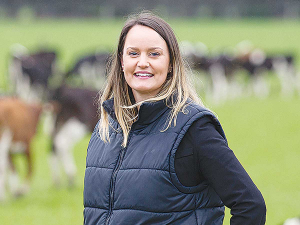Farmer confidence dips slightly, but positivity still dominates
Farmer confidence has taken a slight dip according to the final Rabobank rural confidence survey for the year.
 RaboResearch’s Emma Higgins is remaining cautious regarding commodity prices with New Zealand heading into peak milk production.
RaboResearch’s Emma Higgins is remaining cautious regarding commodity prices with New Zealand heading into peak milk production.
Falling dairy prices in recent months are putting this season’s forecast milk payout under strain.
While Fonterra is maintaining its wide range milk price of $5.90 to $6.90/kgMS for this season, analysts aren’t ruling out trimming their forecast payouts if prices continue to head south.
A higher NZ dollar is also likely to negatively impact NZ dairy sector returns.
Westpac senior agri economist Nathan Penny says he remains cautiously optimistic on the outlook, but risks remain high.
Despite the price fall in last week’s Global Dairy Trade (GDT) event, current prices remain consistent with the bank’s $6.50/kgMS forecast.
“However, while we had allowed for prices to fall, we are running out of runway,” he says.
“In other words, if dairy prices continue to fall over coming auctions, noting that the largest auctions for the season are near, we will consider revising our milk price forecast lower.”
ASB senior economist Chris Tennent-Brown says its forecast of $6.75/kgMS “is under some pressure”.
“We will review our outlook after the next GDT auction and Fonterra announcement,” he says. Fonterra announces its full-year results next week.
RaboResearch’s Emma Higgins says she remains cautious regarding commodity prices as New Zealand heads into peak milk production.
Higgins notes that upwards currency movements are also a bit of a headache for exporters right now, with the NZ/US cross inching higher to sit at 67 cents.
“We do, however, expect recovery in the foodservice channel to continue to improve – this will be an important watch for ensuring market balance.
“We are pulling together the next Global Dairy Quarterly report over the next couple of weeks and will be re-assessing our view on the global dairy market fundamentals.”
Fonterra chairman John Monaghan wrote to shareholders last week asking them to remain cautious with on-farm financial decisions.
Monaghan says the global dairy market is finely balanced at the moment, with both demand and supply increasing but it has the potential to change.
“There is good demand in market at this stage of the season, however, the forecast economic slowdown is likely to increase global unemployment and reduce consumer demand,” he says.
The World Wide Sires National All Day Breeds Best Youth Camp Best All Rounder plaudit has become family affair, with 2026 Paramount Cup winner Holly Williams following in her sister Zara's footsteps.
DairyNZ is giving New Zealand farmers a unique opportunity to gain hands-on governance and leadership experience within the dairy sector.
Herd improvement company LIC has posted a 5.2% lift in half-year revenue, thanks to increasing demand for genetics.
According to the latest Fresh Produce Trend Report from United Fresh, 2026 will be a year where fruit and vegetables are shaped by cost pressures, rapid digital adoption, and a renewed focus on wellbeing at home.
The Roar is a highlight of the game hunting calendar in New Zealand, with thousands of hunters set to head for the hills to hunt male stags during March and April.
OPINION: The past few weeks have been tough on farms across the North Island: floods and storms have caused damage and disruption to families and businesses.